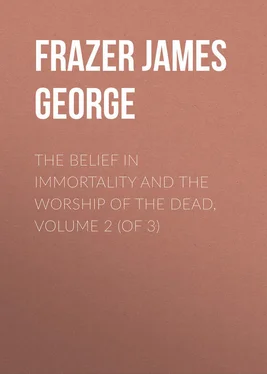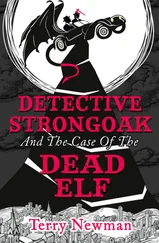James Frazer - The Belief in Immortality and the Worship of the Dead, Volume 2 (of 3)
Здесь есть возможность читать онлайн «James Frazer - The Belief in Immortality and the Worship of the Dead, Volume 2 (of 3)» — ознакомительный отрывок электронной книги совершенно бесплатно, а после прочтения отрывка купить полную версию. В некоторых случаях можно слушать аудио, скачать через торрент в формате fb2 и присутствует краткое содержание. Жанр: foreign_antique, foreign_prose, на английском языке. Описание произведения, (предисловие) а так же отзывы посетителей доступны на портале библиотеки ЛибКат.
- Название:The Belief in Immortality and the Worship of the Dead, Volume 2 (of 3)
- Автор:
- Жанр:
- Год:неизвестен
- ISBN:нет данных
- Рейтинг книги:3 / 5. Голосов: 1
-
Избранное:Добавить в избранное
- Отзывы:
-
Ваша оценка:
- 60
- 1
- 2
- 3
- 4
- 5
The Belief in Immortality and the Worship of the Dead, Volume 2 (of 3): краткое содержание, описание и аннотация
Предлагаем к чтению аннотацию, описание, краткое содержание или предисловие (зависит от того, что написал сам автор книги «The Belief in Immortality and the Worship of the Dead, Volume 2 (of 3)»). Если вы не нашли необходимую информацию о книге — напишите в комментариях, мы постараемся отыскать её.
The Belief in Immortality and the Worship of the Dead, Volume 2 (of 3) — читать онлайн ознакомительный отрывок
Ниже представлен текст книги, разбитый по страницам. Система сохранения места последней прочитанной страницы, позволяет с удобством читать онлайн бесплатно книгу «The Belief in Immortality and the Worship of the Dead, Volume 2 (of 3)», без необходимости каждый раз заново искать на чём Вы остановились. Поставьте закладку, и сможете в любой момент перейти на страницу, на которой закончили чтение.
Интервал:
Закладка:
Further, it is to the credit of the Tongans that, unlike many other Polynesians, they were not generally cannibals, and indeed for the most part held in abhorrence the practice of eating human bodies. Still young warriors occasionally devoured the corpses of their enemies in imitation of the Fijians, imagining that in so doing they manifested a fierce, warlike, and manly spirit. On one occasion, returning from such a repast, they were shunned by every one, especially by the women, who upbraided them, saying, "Away! you are a man-eater." 168 168 W. Mariner, Tonga Islands , i. 194; compare id. i. 317-320.
The government of the Tongan islanders was eminently monarchical and aristocratic. A strict subordination of ranks was established which has been aptly compared to the feudal system. At the head of the social edifice were two chiefs who bore some resemblance to the Emperor and the Pope of mediaeval Europe, the one being the civil and military head of the State, while the other embodied the supreme spiritual power. Nominally the spiritual chief, called the Tooitonga, ranked above the civil chief or king, who paid him formal homage; but, as usually happens in such cases, the real government was in the hands of the secular rather than of the religious monarch. The Tooitonga was acknowledged to be descended from one of the chief gods; he is spoken of by Mariner, our principal authority, as a divine chief of the highest rank, and he is said to have enjoyed divine honours. The first-fruits of the year were offered to him, and it was supposed that if this ceremony were neglected, the vengeance of the gods would fall in a signal manner upon the people. Yet he had no power or authority in matters pertaining to the civil king. 169 169 Captain James Cook, Voyages , v. 424 sqq. ; W. Mariner, Tonga Islands , ii. 74 sqq. , 132 sqq. ; J. Dumont d'Urville, Voyage de l'Astrolabe, Histoire du Voyage , iv. (Paris, 1832) pp. 90 sq. , " Si tout était suivant l'ordre légal à Tonga-Tabou, on verrait d'abord à la tête de la société le toui-tonga qui est le véritable souverain nominal des îles Tonga, et qui jouit même des honneurs divins ."
The existence of such a double kingship, with a corresponding distribution of temporal and spiritual functions, is not uncommon in more advanced societies; its occurrence among a people so comparatively low in the scale of culture as the Tongans is remarkable.
Below the two great chiefs or kings were many subordinate chiefs, and below them again the social ranks descended in a succession of sharply marked gradations to the peasants, who tilled the ground, and whose lives and property were entirely at the mercy of the chiefs. 170 170 Captain James Cook, Voyages , v. 424 sq. , 429 sq. ; W. Mariner, Tonga Islands , ii. 83 sqq.
Yet the social system as a whole seems to have worked well and smoothly. "It does not, indeed, appear," says Captain Cook, "that any of the most civilised nations have ever exceeded this people, in the great order observed on all occasions; in ready compliance with the commands of their chiefs; and in the harmony that subsists throughout all ranks, and unites them, as if they were all one man, informed with, and directed by, the same principle." 171 171 Captain James Cook, Voyages , v. 426.
According to the American ethnographer, Horatio Hale, the mass of the people in the Tonga islands had no political rights, and their condition in that respect was much inferior to that of commoners in the Samoan islands, since in Tonga the government was much stronger and better organized, as he puts it, for the purpose of oppression. On the other hand, he admitted that government in Tonga was milder than in Tahiti, and infinitely preferable to the debasing despotism which prevailed in Hawaii or the Sandwich Islands. 172 172 Horatio Hale, United States Exploring Expedition, Ethnography and Philology , p. 32.
§ 3. The Tongan Religion: its General Principles
For our knowledge of the religion and the social condition of the Tongans before they came under European influence, we are indebted chiefly to an English sailor, William Mariner, who lived as a captive among them for about four years, from 1806 to 1810. 173 173 Mariner was captured by the Tongans on December 1, 1806, and he escaped from the islands in 1810, apparently in November, but the exact date of his escape is not given. See W. Mariner, Tonga Islands , i. 43, ii. 15 sqq. , 68, 69.
His account of the natives, carefully elicited from him and published by a medical doctor, Mr. John Martin, M.D., is one of the most valuable descriptions of a savage people which we possess. Mariner was a good observer and endowed with an excellent memory, which enabled him to retain and record his experiences after his return to England. He spoke the Tongan language, and he was a special favourite of the two Tongan kings, named Finow, who reigned successively in Tonga during his residence in the islands. The kings befriended and protected him, so that he had the best opportunities for becoming acquainted with the customs and beliefs of the people. His observations have been confirmed from independent sources, and we have every reason to regard them as trustworthy. So far as we can judge, they are a simple record of facts, unbiassed by theory or prejudice. In the following notice of the Tongan religion and doctrine of the human soul I shall draw chiefly on the evidence of Mariner.
According to him, the religion of the Tonga islanders rests, or rather used to rest, on the following notions. 174 174 W. Mariner, Tonga Islands , ii. 97 sqq.
They believed that there are hotooas , 175 175 The word is commonly spelled atua in the Polynesian languages. See E. Tregear, Maori-Polynesian Comparative Dictionary (Wellington, N.Z. 1891), pp. 30 sq. , who gives otua as the Tongan form.
gods, or superior beings, who have the power of dispensing good and evil to mankind, according to their merit, but of whose origin the Tongans formed no idea, rather supposing them to be eternal.
They believed that there are other hotooas or gods, who are the souls of all deceased nobles and matabooles , that is, the companions, ministers, and counsellors of the chiefs, who form a sort of inferior nobility. 176 176 As to the matabooles see W. Mariner, Tonga Islands , ii. 84 sqq.
The souls of all these dead men were held to possess a power of dispensing good and evil to mankind like the power of the superior gods, but in a lesser degree.
They believed that there are besides several hotooa pow , or mischievous gods, who never dispense good, but only petty evils and troubles, not as a punishment, but indiscriminately to anybody, from a purely mischievous disposition.
They believed that all these superior beings, although they may perhaps have had a beginning, will have no end.
They believed that the world also is of uncertain origin, having coexisted with the gods. The sky, which they regard as solid, the heavenly bodies, and the ocean were in being before the habitable earth. The Tonga islands were drawn up out of the depth of the sea by the god Tangaloa one day when he was fishing with a line and a hook.
They believed that mankind, according to a partial tradition, came originally from Bolotoo, the chief residence of the gods, a fabulous island situated to the north-west of the Tongan archipelago. The first men and women consisted of two brothers, with their wives and attendants. They were commanded by the god Tangaloa to take up their abode in the Tonga islands, but of their origin or creation the Tongans professed to know nothing. 177 177 According to a later account, "on Ata were born the first men, three in number, formed from a worm bred by a rotten plant, whose seed was brought by Tangaloa from heaven. These three were afterwards provided by the Maui with wives from the Underworld." See E. E. V. Collocot, "Notes on Tongan Religion," Journal of the Polynesian Society , xxx. (1921) p. 154.
Интервал:
Закладка:
Похожие книги на «The Belief in Immortality and the Worship of the Dead, Volume 2 (of 3)»
Представляем Вашему вниманию похожие книги на «The Belief in Immortality and the Worship of the Dead, Volume 2 (of 3)» списком для выбора. Мы отобрали схожую по названию и смыслу литературу в надежде предоставить читателям больше вариантов отыскать новые, интересные, ещё непрочитанные произведения.
Обсуждение, отзывы о книге «The Belief in Immortality and the Worship of the Dead, Volume 2 (of 3)» и просто собственные мнения читателей. Оставьте ваши комментарии, напишите, что Вы думаете о произведении, его смысле или главных героях. Укажите что конкретно понравилось, а что нет, и почему Вы так считаете.











